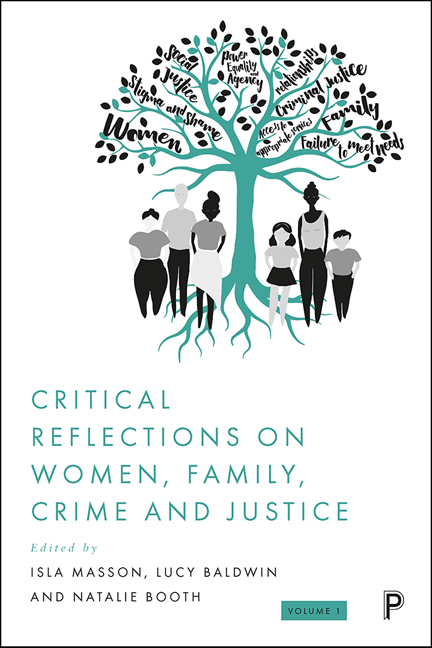Book contents
- Frontmatter
- Contents
- List of figures
- Notes on the contributors
- Acknowledgements
- Foreword: critical reflections from the Women, Family, Crime and Justice network
- 1 Starting the conversation: an introduction to the Women, Family, Crime and Justice network
- 2 Playing the game: women and community punishment
- 3 Harmful social and cultural practices that exist within South Asian communities in the UK and their impact on women
- 4 Exploring shame, love and healing within women’s recovery: an analysis of a trauma-specific intervention
- 5 Reducing the enduring harm of short terms of imprisonment
- 6 ‘Without it you’re lost’: examining the role and challenges of family engagement services in prisons
- 7 What are the challenges and opportunities for schools in supporting children of people in prison?
- 8 Impact and engagement work in the context of families of people in prison
- 9 Presence, voice and reflexivity in feminist and creative research: a personal and professional reflection
- 10 Service users being used: thoughts to the research community
- 11 Continuing the conversation: reflections from the Women, Family, Crime and Justice network
- Index
5 - Reducing the enduring harm of short terms of imprisonment
Published online by Cambridge University Press: 21 December 2021
- Frontmatter
- Contents
- List of figures
- Notes on the contributors
- Acknowledgements
- Foreword: critical reflections from the Women, Family, Crime and Justice network
- 1 Starting the conversation: an introduction to the Women, Family, Crime and Justice network
- 2 Playing the game: women and community punishment
- 3 Harmful social and cultural practices that exist within South Asian communities in the UK and their impact on women
- 4 Exploring shame, love and healing within women’s recovery: an analysis of a trauma-specific intervention
- 5 Reducing the enduring harm of short terms of imprisonment
- 6 ‘Without it you’re lost’: examining the role and challenges of family engagement services in prisons
- 7 What are the challenges and opportunities for schools in supporting children of people in prison?
- 8 Impact and engagement work in the context of families of people in prison
- 9 Presence, voice and reflexivity in feminist and creative research: a personal and professional reflection
- 10 Service users being used: thoughts to the research community
- 11 Continuing the conversation: reflections from the Women, Family, Crime and Justice network
- Index
Summary
Introduction
Despite a growing body of literature on prisons, and how these are experienced by those held within their walls, this literature remains predominantly focused on the male estate due to their overwhelming majority status (Ministry of Justice (MoJ), 2020a). Women continue to ‘remain marginal to the study and practice of imprisonment’ (Moore and Scraton, 2014, p 1), despite knowledge that they have very specific and particularly painful experiences in prison. Short periods within prison are particularly common for women. For example, 43 per cent of all first receptions into female prison establishments between 2016 and 2019 were remand prisoners (either unconvicted or unsentenced), and over 81 per cent of first sentenced female prison receptions were serving under 12 months (the majority of which were under six months) (MoJ, 2017, 2018c, 2019c, 2020a).
While these experiences are frequently short, the need for prison is questionable, given that the women are rarely violent offenders and thus typically represent a low risk to public safety (MoJ, 2017, 2018c, 2019c, 2020a). Furthermore, use of short terms of incarceration is problematic for both the government, as a financially costly procedure, and for the women, as it represents a disproportionate punishment due to the enduring harms caused. Neither remand nor short prison sentences provide support to women, often instead causing tangible issues with finances, education, employment and housing, or consequences to health and wellbeing, which include physical health, addictions and psychological harm.
Prison is rarely a fitting punishment for women with non-violent offences and thus low-risk status. It is argued that the harms caused are typically disproportionate to the original offences, and while these punishments have attracted recent attention from academics, practitioners, penal reformists and policy makers (for example Baldwin and Epstein, 2017; MoJ, 2018b), there has been little change in their use.
Towards rebalancing this injustice and learning from the voices of those who have already suffered, the current research explores the enduring harms of first short terms of imprisonment with the aim of providing practical recommendations to mitigate future harm. The results of a number of post-custody interviews with 16 mothers aged between 25 and 51 are presented here. Each of the women identified as a mother and had experienced a short period in prison for the first time (on remand or sentenced to less than 12 months) for a nonviolent offence.
- Type
- Chapter
- Information
- Critical Reflections on Women, Family, Crime and Justice , pp. 81 - 106Publisher: Bristol University PressPrint publication year: 2021
- 1
- Cited by



